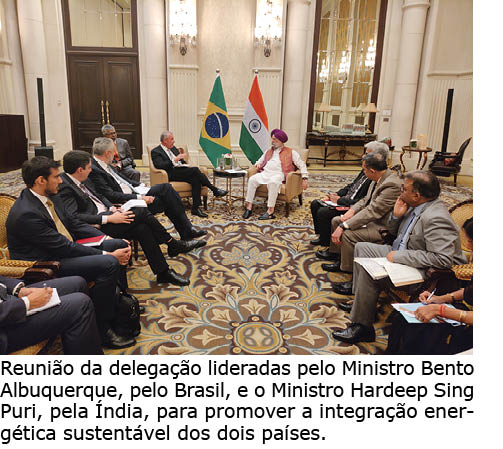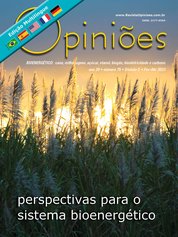Bento Albuquerque
Consultor Especialista em Defesa, Energia e Mineração
OpAA75
Liderança internacional do Brasil para promoção da bioenergia
Durante meu período à frente do Ministério de Minas e Energia, buscamos aprofundar e estreitar as relações internacionais. O País, hoje, ocupa posição de destaque junto à Agência Internacional de Energia e é um importante ator na agenda da produção sustentável de energia.
Em janeiro de 2020, em missão de Estado para a Índia, foram assinados três memorandos de entendimento nos setores de energia e mineração. Nos anos subsequentes, por meio das equipes técnicas, apesar da pandemia da Covid-19, foram discutidas e intensificadas as possibilidades de cooperação entre os dois países.
O amadurecimento do diálogo e a vontade política levaram, em abril de 2022, à realização de uma missão liderada pelo Ministério de Minas e Energia do Brasil, com a participação da Empresa de Pesquisa Energética - EPE, de comitiva brasileira de dirigentes empresariais do setor sucronergético (Unica, Apla, Exal, Foro Sucroenergético, Copersucar, Bunge/BP) e automotivo (Volkswagen, Toyota, Stelantis e Abraciclo/Yahama), e da Petrobras.
 Fruto de uma agenda bem organizada, foram realizadas reuniões e troca de informações entre os produtores de etanol e a indústria automotiva, tendo como principais resultados a colaboração entre Brasil e Índia na redução do consumo de água para produção do biocombustível, no aprimoramento do desenvolvimento tecnológico de etanol de segunda geração e no desenvolvimento da plataforma de mobilidade sustentável com a valorização da bioenergia.
Fruto de uma agenda bem organizada, foram realizadas reuniões e troca de informações entre os produtores de etanol e a indústria automotiva, tendo como principais resultados a colaboração entre Brasil e Índia na redução do consumo de água para produção do biocombustível, no aprimoramento do desenvolvimento tecnológico de etanol de segunda geração e no desenvolvimento da plataforma de mobilidade sustentável com a valorização da bioenergia.
Destacou-se, na oportunidade, a importância da política nacional de biocombustíveis do Brasil (RenovaBio), que permitirá evitar as emissões de 670 milhões de toneladas de dióxido de carbono equivalente, de 2020 até 2030, e como essa política de Estado possibilita a melhora da eficiência energético-ambiental das usinas de etanol, atraindo investimentos e gerando empregos e renda. Os representantes do setor automotivo brasileiro compartilharam a experiência nacional com utilização de 27% de etanol na gasolina, as vantagens do etanol como booster de octanagem e quais as adaptações foram necessárias para utilização do biocombustível.
O esforço realizado permitiu a continuidade das tratativas e, neste ano de 2023, tivemos um pavilhão dedicado exclusivamente ao etanol na Auto Expo Motor Show 2023, principal e maior salão de automóveis da Ásia, com a participação destacada da UNICA, pelo Brasil, e da SIAM – Society of Indian Automobile Manufacturers, pela Índia Dessa forma, a partir das relações internacionais conduzidas com planejamento e previsibilidade, o Brasil e seus parceiros estão construindo uma solução de mobilidade sustentável para o hemisfério sul e norte, em que um dos alicerces é a bioenergia.
Importância dos biocombustíveis para Brasil e Índia: O Brasil é um dos maiores produtores e consumidor de biocombustíveis. Em 2021, foram evitadas emissões de 24 milhões de toneladas de CO2eq pela substituição de combustíveis fósseis por biocombustíveis. Considerando o mercado automotivo, em que ocupa o oitavo maior mercado de veículos leves e o quarto maior mercado de veículos pesados, onde são flex fuel, 94% dos veículos de passeio e 51% dos veículos comerciais, o País se apresenta como um importante vetor da transição energética da mobilidade de baixo carbono para o mundo.
Já a Índia, como terceiro maior mercado de combustíveis do mundo, sendo o segundo maior produtor de açúcar e o quarto maior mercado de veículos, tem os biocombustíveis como um alicerce para a descarbonização da sua matriz de transporte. A gasolina no país, hoje, tem 10% de etanol e estará progredindo para uma mistura de 20% a partir de 2023. Importante destacar que o país possui dependência externa de 85% do petróleo, sendo muito relevante para a segurança energética reduzir a utilização de combustíveis fósseis, bem como para a melhoria da qualidade do ar.
Balança comercial Brasil-Índia no setor de energia: A Índia é o quinto parceiro comercial brasileiro no mundo, com volume total de exportações e importações, em 2021, de US$ 11,53 bilhões. As exportações totalizam US$ 4,80 bilhões, sendo 47% de petróleo, 16% de gorduras e óleos vegetais e 13% de ouro. As importações representam US$ 6,73 bilhões, sendo de combustíveis (principalmente diesel) com 20%, compostos orgânicos e inorgânicos com 13%, assim como inseticidas e fungicidas com 8,4%, dentre outros. Esses dados, aliado às características de complementaridade entre as duas economias, demonstram o potencial de crescimento nas relações comerciais e empresariais entre os dois países.
Aliança Brasil-Índia em bioenergia: A adoção de etanol na gasolina pela Índia permite o aumento da octanagem do combustível comercializado naquele país, o maior equilíbrio do mercado de açúcar pela redução da oferta desse produto, a redução das emissões de gases do efeito estufa e da dependência externa de petróleo, proporcionando segurança energética e maior sustentabilidade à sua matriz energética.
Perspectivas para o Futuro: A aliança Brasil-Índia permitirá:
a) Desenvolver metodologia harmonizada de análise de ciclo de vida do poço à roda para avaliação da mobilidade sustentável, cuja importância foi materializada na criação do Programa Combustível do Futuro, criado pelo Conselho Nacional de Política Energética em 2021;
b) Avanços na tecnologia flex-fuel e híbridos flex, dado que os desenvolvimentos tecnológicos não ficariam restritos ao Brasil, juntando dois importantes centros de produção de veículos;
c) Aumento da produtividade da cana-de-açúcar pelo compartilhamento das experiências e das variedades dos dois países;
d) Combustíveis sustentáveis de aviação (SAF), que é uma importante fronteira para a indústria de açúcar e etanol, dado que podemos produzir, no Brasil, 9 bilhões de litros por ano, fora um potencial gigantesco na Índia;
e) Etanol de segunda geração, com os dois paí-
ses juntando esforços para aumentar a oferta de etanol, sem haver aumento de área plantada, e
f) Células a combustível, em que o etanol e o biometano serão as fontes de hidrogênio.




